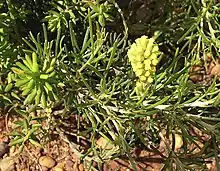Petrophile conifera
Petrophile conifera is a species of flowering plant in the family Proteaceae and is endemic to southwestern Western Australia. It is a bushy, much-branched shrub with pinnate, sharply-pointed leaves, and oval heads of hairy, cream-coloured to yellowish white flowers.
| Petrophile conifera | |
|---|---|
 | |
| In Sandy Gully | |
| Scientific classification | |
| Kingdom: | Plantae |
| Clade: | Tracheophytes |
| Clade: | Angiosperms |
| Clade: | Eudicots |
| Order: | Proteales |
| Family: | Proteaceae |
| Genus: | Petrophile |
| Species: | P. conifera |
| Binomial name | |
| Petrophile conifera | |
| Synonyms[1] | |
|
Petrophila conifera Meisn. orth. var. | |
Description
Petrophile conifera is a bushy, much-branched shrub that typically grows to a height of 0.3–1.5 m (1 ft 0 in–4 ft 11 in) and has woolly-hairy young branchlets. The leaves are glabrous, 40–110 mm (1.6–4.3 in) long on a petiole 20–50 mm (0.79–1.97 in) long. They are rigid and needle-like, pinnately divided with sharply-pointed pinnae 4–35 mm (0.16–1.38 in) long. The flowers are arranged on the ends of branchlets in sessile, oval heads 20–30 mm (0.79–1.18 in) long, with hairy, lance-shaped involucral bracts at the base. The flowers are 8–15 mm (0.31–0.59 in) long, hairy, cream-coloured, creamy yellow or yellowish white. Flowering occurs from August to October and the fruit is a nut, fused with others in an oval head 10–30 mm (0.39–1.18 in) long.[2][3]
Taxonomy
Petrophile conifera was first formally described in 1855 by Carl Meissner in Hooker's Journal of Botany and Kew Garden Miscellany from material collected by James Drummond.[4][5] The specific epithet (conifera) means "cone-bearing".[6]
In 2011, Michael Clyde Hislop and Kelly Anne Shepherd described two subspecies in the journal Nuytsia and the names are accepted by the Australian Plant Census:[7]
- Petrophile conifera Meisn. subsp. conifera has petioles 20–48 mm (0.79–1.89 in) long and involucral bracts 0.9–2.2 mm (0.035–0.087 in) wide;[8]
- Petrophile conifera subsp. divaricata B.L.Rye & K.A.Sheph.[9] has petioles 12–24 mm (0.47–0.94 in) long and involucral bracts 2.5–4.1 mm (0.098–0.161 in) wide.
Distribution and habitat
This petrophile grows in heath and on sandplains and is common north of Geraldton in the Avon Wheatbelt and Geraldton Sandplains biogeographic regions of southwestern Western Australia.[2][3] Subspecies conifera is found from Eurardy Reserve and Kalbarri National Park to the Chapman River near Geraldton and subsp. divaricata only occurs near Coorow.[7]
Conservation status
Petrophile conifera subsp. conifera is classified as "not threatened"[10] but subsp. divaricata is classified as "Priority Two" by the Western Australian Government Department of Parks and Wildlife,[11] meaning that it is poorly known and from only one or a few locations.[12]
References
- "Petrophile conifera". Australian Plant Census. Retrieved 8 December 2020.
- Foreman, David B. "Petrophile conifera". Australian Biological Resources Study, Department of Agriculture, Water and the Environment: Canberra. Retrieved 6 December 2020.
- "Petrophile conifera". FloraBase. Western Australian Government Department of Parks and Wildlife.
- "Petrophile conifera". APNI. Retrieved 8 December 2020.
- Meissner, Carl (1855). "New Proteaceae of Australia". Hooker's Journal of Botany and Kew Gardens Miscellany. 7: 67. Retrieved 8 December 2020.
- Sharr, Francis Aubi; George, Alex (2019). Western Australian Plant Names and Their Meanings (3rd ed.). Kardinya, WA: Four Gables Press. p. 169. ISBN 9780958034180.
- Rye, Barbara L.; Hislop, Michael C.; Shepherd, Kelly A.; Hollister, Chris (2011). "New south-western Australian members of the genus Petrophile (Proteaceae: Petrophileae), including a hybrid" (PDF). Nuytsia. 21 (2): 46–47. Retrieved 8 December 2020.
- "Petrophile conifera subsp. conifera". Australian Plant Census. Retrieved 8 December 2020.
- "Petrophile conifera subsp. divaricata". Australian Plant Census. Retrieved 8 December 2020.
- "Petrophile conifera subsp. conifera". FloraBase. Western Australian Government Department of Parks and Wildlife.
- "Petrophile conifera subsp. divaricata". FloraBase. Western Australian Government Department of Parks and Wildlife.
- "Conservation codes for Western Australian Flora and Fauna" (PDF). Government of Western Australia Department of Parks and Wildlife. Retrieved 8 December 2020.